Studio, Quantic Dream is best known to the PlayStation fanbase for two polarizing titles. You probably loved the murder mystery of Heavy Rain but were less than impressed by the military ghost story Beyond: Two Souls. The developer’s newest story-driven adventure game, Detroit: Become Human came with mixed expectations but we’re here to tell you (without spoiling anything) the experience after dozens of hours leaves you in awe of one of the best narratives of 2018.
Detroit: Become Human
Developer: Quantic Dream
Published by: Sony Interactive
Available for: PlayStation 4
Detroit: Become Human is a science fiction story about machines turning on their masters. Not a particularly uncommon plot in the genre but developer Quantic Dream takes the route few of the classics do and brings you a tale from the mechanical perspective while attempting a rare experiment in storytelling; giving the player near total agency over how the story plays out.
Set in a future Detroit Michigan (2039), the game puts players in an allegory using androids to navigate a deep and meaningful set of issues. You’ll take on the role of three android main characters: a personal assistant named Markus, domestic task bot Kara, and a crime solving droid going by Connor. The rise of human-like androids has created a world teetering on unrest as this legalized purchasable class of slave labor is bought and used for jobs that range anywhere from janitorial to black ops military and everything in between. All these androids spring from one central global company called Cyberlife, which itself is an avatar for the Google and Apples of the real world. The subtle world control Cyberlife has comes under tension from a human public being displaced in the workforce and the androids themselves becoming self-aware.
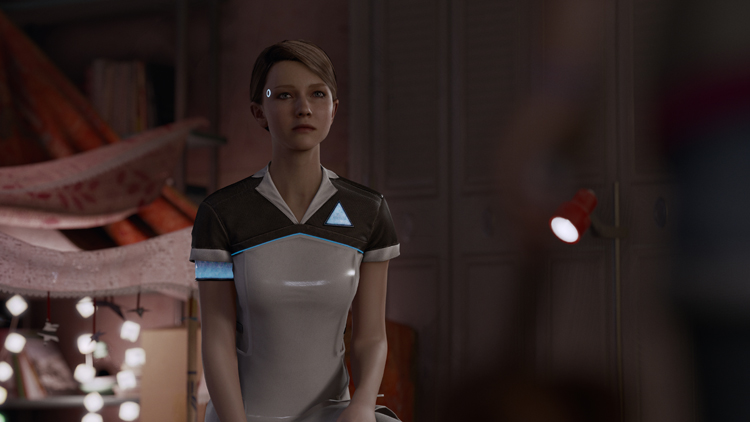
Detroit’s experiment in storytelling is the fluidity which players will have. There’s no way to stop the story once you get it going. No “game over” screens or fail states exist for your characters. What that boils down to is the importance of choice. You’ll shape the story with dialogue choices and actions you either take or don’t. We previously talked about the game’s demo where Connor’s decisions either led to the death of a young girl at the hands of a deviant android or saving her from falling off a building. While there are multiple outcomes possible between those bookends, the game continues regardless of what outcome you end a mission on. Even if that particular instance ended with Connor’s death.
Everything about this game relies on the choices you’ll make, some under visible timers while others use audio cues. Not being able to essentially stop the game by failing should logically eliminate tension from the experience, but Detroit’s parlor trick makes the opposite true. Knowing your experience progresses no matter what makes playing the game feel all-or-nothing.
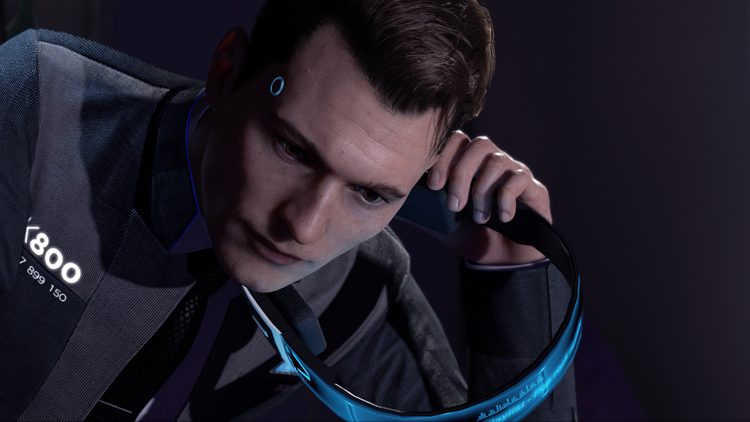
Choice is a fickle mechanic in most video games due to the fact that in most games players are ultimately on a set story path whose road is only as narrow as the writer allows it to be. If most games are a two-lane highway, Detroit: Become Human is an eight-lane autobahn. Not only is story dramatically different and nearly unrecognizable to other players based on your decision making, but the moral dilemmas that underline those choices leave you feeling the consequences and not just on the avatars you’re playing as. It’s the bar of any game that makes variable outcomes based on choice it’s bread and butter; do the choices I make have a real weight on me as the person pushing the buttons of a controller? In DBH they most certainly do.
Before we talk about the implications of the game. We have to examine the game’s fourth character, the future city of Detroit. In the real world, Detroit has been trying to recover from economic disparity from its reliance on the nearly non-existent auto manufacturing industry for decades. In the game, this Detroit is one still stricken by poverty that in theory should have been alleviated by Cyberlife’s android manufacturing economy stimulation. What plays out is far from a utopia. Instead, we see a city where the have and have not divide is wider than ever. The android slave workforce is looked upon with contempt by many different classes of people. Even the cops we see in this world are afraid of losing their livelihoods to this emerging form of life. Riots, crime, technology, hope, and a place in need of rebrith all add up to make Robocop’s hometown the perfect setting for this game.
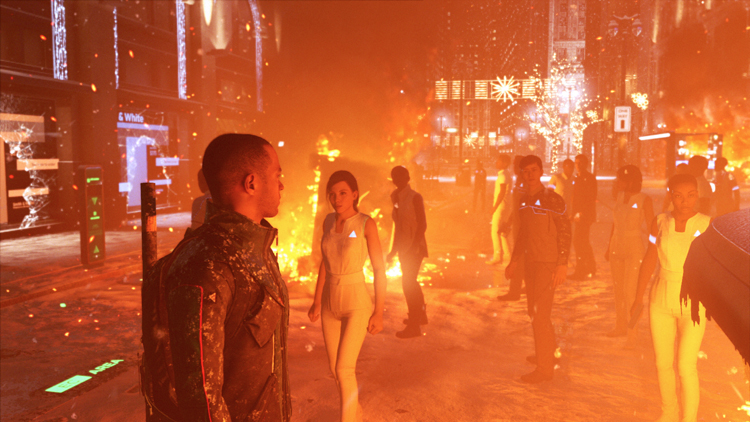
Detroit: Become Human isn’t for everyone. If you’re among those who use pejoratives such as “walking simulator” or believe games live and die by things like leveling up, skill trees, or other RPG elements then this game isn’t for you. This is a game for anyone looking to dive down a well of story that examines what it means to be human. It’ll beg questions such as authority over creations? The ethical, spiritual, and economic concerns over artificial intelligence we face in our own world. Players may even find themselves asking microscopic existential questions such as why some humans can treat something they wanted to own with such malice and contempt?
Resonance wouldn’t even begin to describe the feeling you’re left with after experiencing the game’s branching narrative. As I write this, I found myself still thinking about the decisions made through dozens of hours in the game’s story. It shows the replay value of Detroit is in diving back in and fighting your personal nature to see the multiple ways the story could have played out. Quantic Dream makes it easier by providing you with a flow chart at the end of every chapter showing you the paths you could have unlocked. It even allows you to replay chapters to venture down those alternate story paths without playing through the entire game all over. Though you’ll probably want to anyway.
While this is a formal review and not an editorial. It’s worth noting what Detroit: Become Human has the potential to be an example of something bigger. If some video games encourage and teach people to be more violent (which I don’t believe to be the case) then by reflexive property Detroit BH has the potential to teach people to be better to one another through the examination of these androids in what it means to be self-aware. That’s a rare power in any storytelling medium.
While the game isn’t perfect, its flaws only rest in some strange camera choices and some minor parts with dialogue that doesn’t feel as polished as the overall package. To be honest, it’s as close to perfect as the developer probably imagined it would be. Ultimately, Detroit: Become Human eclipses Quantic Dream’s previous games in terms of scale, visual fidelity, and emotional power. You’ll be blown away by how reliant the game is on your choices, yet how out of control things feel for you in those moments when the lives of characters you’ve bonded with hang in the balance. A game that relies on choice could easily go off the rails but the connection you have with these well-written characters tugs at your emotions throughout. Play this game around anyone who doubts the storytelling potential of video games.
SCORE:
10/10 Detroit: Become Human is a breakthrough of the immersive story power in video games.


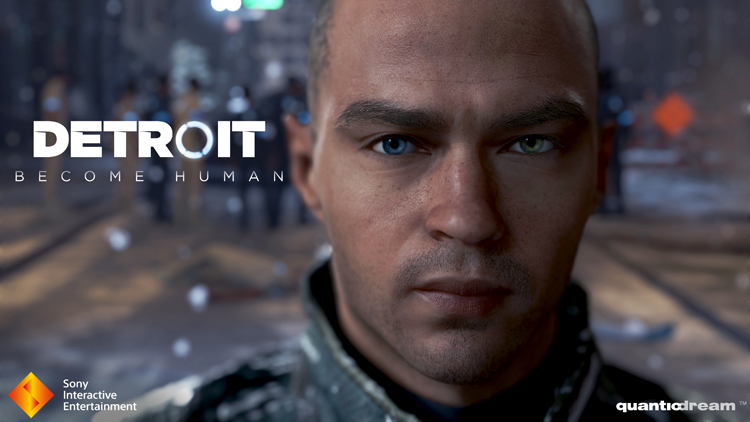
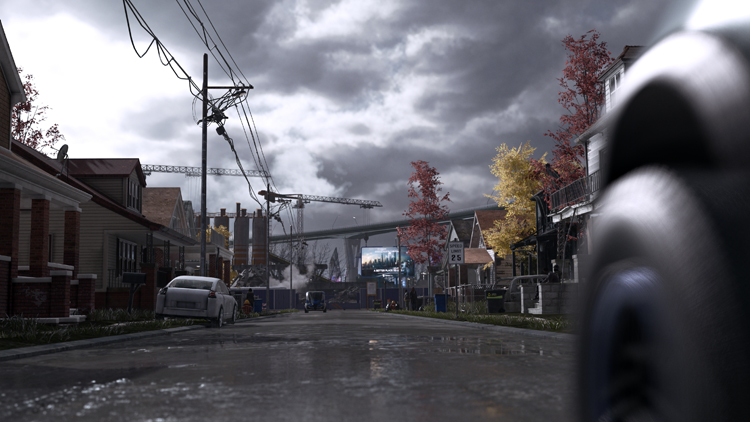
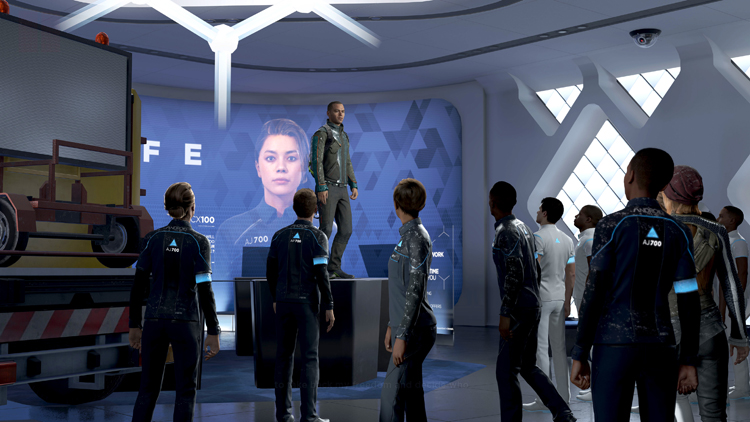
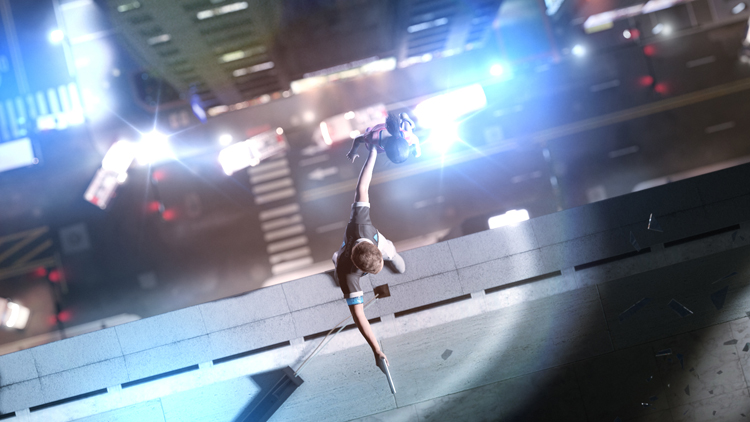






Comments are closed.